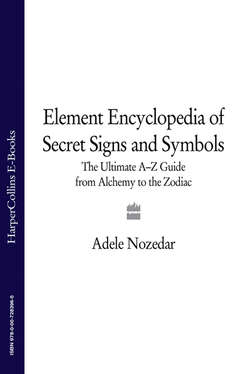Читать книгу The Element Encyclopedia of Secret Signs and Symbols: The Ultimate A–Z Guide from Alchemy to the Zodiac - Adele Nozedar - Страница 103
CAGLIOSTRO SEAL
ОглавлениеThis curious sigil, the image of a snake, impaled by an arrow but with an apple in its mouth, presses all sorts of symbolic buttons; all three elements of the seal are powerful emblems in themselves. Is this the snake that tempted Eve with the apple, being punished for its transgressions? The snake also makes a curious S shape; is this significant, and if so, how? In addition, the union of the line of the arrow and the serpent seems to make a lemniscate, or figure-of-eight, symbol, meaning infinity. Unfortunately, it seems as though the precise meaning of the seal died with its namesake.
Cagliostro himself seems to be as mysterious as his seal. The self-styled Count Alessandro di Cagliostro was actually born as the much less grand-sounding Guiseppe Balsamo, and lived in Italy in the eighteenth century. The rumors surrounding his life and adventures come thick and fast and there is very little that is known for certain, due in no small part to the dense forest of fantastical stories that Cagliostro seems to have hidden himself within. He said that he had been born into the nobility but for some reason was abandoned on Malta, whereupon he wandered, as a child, throughout Morocco and Egypt where he learned many arcane mysteries, including those of the Kabbalah and alchemical magic. Whatever the truth, he certainly had skills as a pharmacist. It seems that the secure advantages of regular employment held no attraction for the Count, his attention being much more drawn to magical and mystical matters. He became a maker and vendor of magical amulets and talismans, and later, forgeries, including letters, certificates, and a myriad of official documents. He also offered the sexual favors of his beautiful young wife as trade for instruction in forgery.
Cagliostro’s seal has been the result of much analysis and conjecture, its appearance so convincing that it was even incorporated into an early Masonic-style organization called The Brotherhood of Luxor.
